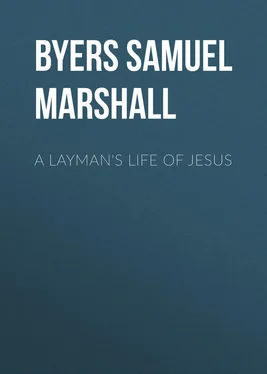Samuel Byers - A Layman's Life of Jesus
Здесь есть возможность читать онлайн «Samuel Byers - A Layman's Life of Jesus» — ознакомительный отрывок электронной книги совершенно бесплатно, а после прочтения отрывка купить полную версию. В некоторых случаях можно слушать аудио, скачать через торрент в формате fb2 и присутствует краткое содержание. ISBN: , Издательство: Иностранный паблик, Жанр: foreign_antique, foreign_prose, Биографии и Мемуары, foreign_language, на английском языке. Описание произведения, (предисловие) а так же отзывы посетителей доступны на портале библиотеки ЛибКат.
- Название:A Layman's Life of Jesus
- Автор:
- Издательство:Иностранный паблик
- Жанр:
- Год:неизвестен
- ISBN:http://www.gutenberg.org/ebooks/41500
- Рейтинг книги:4 / 5. Голосов: 1
-
Избранное:Добавить в избранное
- Отзывы:
-
Ваша оценка:
- 80
- 1
- 2
- 3
- 4
- 5
A Layman's Life of Jesus: краткое содержание, описание и аннотация
Предлагаем к чтению аннотацию, описание, краткое содержание или предисловие (зависит от того, что написал сам автор книги «A Layman's Life of Jesus»). Если вы не нашли необходимую информацию о книге — напишите в комментариях, мы постараемся отыскать её.
A Layman's Life of Jesus — читать онлайн ознакомительный отрывок
Ниже представлен текст книги, разбитый по страницам. Система сохранения места последней прочитанной страницы, позволяет с удобством читать онлайн бесплатно книгу «A Layman's Life of Jesus», без необходимости каждый раз заново искать на чём Вы остановились. Поставьте закладку, и сможете в любой момент перейти на страницу, на которой закончили чтение.
Интервал:
Закладка:
Samuel H. M. Byers
A Layman's Life of Jesus
Every book should have a purpose. The object of this little volume is to try and harmonize, in a sense, and bring nearer to us, the story of the Master. It is free from the fog of creed, and the simple picture of the Times and the Man may help to waken new interest, especially with the young in the greatest tale of the world.
S. H. M. B.Des Moines, Sept. 3, 1912.
CHAPTER I
Palestine two thousand years ago. The Little Land of Galilee. An Oriental Village. The Boy Carpenter.
One of the beauty spots of the world, a couple of thousand years ago, was the little land of Galilee, in upper Palestine. That was a land for poets and painters.
Lonesome, deserted, and little inhabited as it seems now, there was a time when this little paradise of earth had many people and many handsome cities. "In my time," says Josephus, "there were not less than four hundred walled towns in Galilee." Nature, too, was lavish in its gifts to this little land. There were green valleys there, picturesque mountains, clear blue lakes, running brooks, and grassy fields. An Eastern sun shone on the province almost all the time. There was no winter there. Like a diamond in the very heart of this beautiful land sat the town of Nazareth, "The Flower of Galilee." Close by the village were the hills that fenced in the upper end of the plain of beautiful Esdralon. Figs grew there at Nazareth, and oranges, and grapes luscious and bountiful as nowhere else. The flower-lined lanes stretched from the village clear down to the blue lake of Galilee, only a dozen miles or so away. It must have been a delight to live in a climate so delicious, in a land so lovely.
It all belonged to Rome then, as did the whole country known as Palestine. The Romans had divided the land into three provinces, – Galilee, Samaria, and Judea, with its splendid city of Jerusalem, then one of the noted capitals of the world. Governors or kings were appointed for these three provinces by the emperors at Rome; they were usually Orientals.
Just now two sons of Herod the Great, oftener known as "the splendid Arab," are ruling there. The one named Herod is at Jerusalem; his brother Antipater, or Herod Antipas, is governing little Galilee in the north end of Palestine. Like many another Oriental king he is an idle, luxurious, dissipated, and corrupt ruler.
There is yet another brother of these two kings. His name is Philip, and he lives in Rome. He has a very beautiful wife, who some day is to bring great trouble on the world, for Antipater will yet desert his Galilean queen and marry this Roman beauty.
It is all in the time of the great Augustus that we are talking of now. In Rome it is called the Golden Age. It is not quite that in Palestine. Yet the world's greatest era is just beginning there. In how small a territory the world's greatest deeds are about to be enacted! Palestine, taken all together, did not make much of a country in area; many of the states in the American union have more square miles, but all the nations in the world combined have no such history. Palestine is a strip of territory reaching along the Mediterranean for one hundred and fifty miles on one side, and along the Arabian desert on the other. It is hardly over sixty miles across. It is topographically of the most diversified character. It has some beautiful valleys and purling streams; it has mountains, too, lofty and desolate, and its principal lakes are almost a thousand feet below the level of the sea. The whole land is cut in two lengthwise by the Jordan river, the most peculiar, the most rapid, and the most historic river on the face of the earth.
We are now in Galilee. In the midst of the wonderful beauty of the scene at Nazareth any one would be attracted by the appearance of a youth there who is just out of school. This Nazareth, though not His birthplace, is His home; here all His brothers and sisters and cousins live. In a village close by His mother Mary was born. The boy's own birth was at a country inn up near Jerusalem, at a time when His parents had gone there to pay taxes, and be counted as citizens of the Roman empire.
The lovely little village where this youth is, happy among His kith and kin, is not unlike many an Oriental village of to-day. Strange little stone-paved streets run into the open square where the fountain of the village is. And this is the fountain where, on summer evenings, the village girls, among them the beautiful Mary herself, came for water. The little square, and the streets, and possibly some of the old houses, and the ruins of the fountain are there yet, in this 1912, and clustering vines and roses are still there – and so too are the clear skies, the starlit nights, the purple hills, and the dark-eyed women, just as in the long ago.
CHAPTER II
A Boy of Babylon. The Founder of Judaism. Philo, the Philosopher. An out-door Man. The Poet-Carpenter. Staying in the Desert. The Silence of History. Where was Jesus in these silent years?
Let us go back to that long ago for a little while. At the foot of one of the little streets, close by the square and the fountain, stands a simple shop for carpenters. At the door, ax and saw in hand, we see again that Galilean youth. He is a carpenter's apprentice now, and is working with Joseph, His father. He is tall and beautiful, His eyes are blue, and very mild – His hair is yellow. He is wearing the working-man's costume common to Galileans of His age. He is perhaps twenty – handsome in countenance, and kindly beyond expression. He has long since finished with the little village school, where the tasks consisted only in chanting verses from the Scriptures with the other boys and girls of the village. But as He was apt, He has learned the Scriptures well. He knows them by heart almost; and later at the synagogue He heard the priests read from the Great Hillel, the Babylonian, who is writing and saying things about life, religion, and the Scriptures that are shaking the religious world. Philo, also, He almost knows by heart. He also knows the Psalms of David, the Proverbs of Solomon, as well as the aphorisms and maxims, the dreams and stories of great men who were writing in Palestine just before He was born. It was a day of maxims in literature. Men wrote short, strong, simple sentences, full of thought. Their sayings were easy to remember. Indeed, even to-day, there is no book so easy to commit to memory as the Bible.
The young carpenter stored them all in a retentive mind. Some day He would have use for them. At times the youth stops His work and talks with His father Joseph about the magnificent temple that Herod is just completing up there at Jerusalem. He has seen it often as a boy, and He tells of the strange questions the priests there once asked Him, and how easily He answered every one. He is talking in the peculiar Arimean dialect, a speech ridiculed in great Jerusalem, as everywhere else, outside His Galilee. Occasionally, too, He is relating to His father the beautiful aphorisms from the gentle Hillel.
And who is this wonderful Hillel of whom Testament writers and teachers say almost nothing at all? Few of the young ever heard of him. We must ask, for some have even called him another Jesus, he was so good and great. He was a very princely Jew, this Hillel, this lover of mankind, this gentle and humane reformer, whose life benefited the whole age in which he lived. As a poor Babylonian youth, he went over to Jerusalem to study under the great rabbis of the church. He soon became very distinguished, and through him Jewish life and religion were reformed. He is often called the founder of Judaism as taught in the Talmud. Herod made him president of the great Sanhedrin, with the title of prince, and the honor descended in his family. His aphorisms, his maxims, his wise sayings were known to every Jew in Palestine, and affected all Jewish life. One of his sayings was: "Do not unto others what thou wouldst not have done unto thyself. This is the whole law; the rest go and finish." Another: "Do not believe in thyself till the day of thy death." Again: "If I do not care for my soul, who will do it for me?" Still one: "Say not I will repent at leisure. Leisure may never come." And another: "Whosoever is ambitious of aggrandizing his name will destroy it." Beyond a doubt, many of the sayings of this great and gentle teacher were as familiar to the young carpenter working at His bench in little Nazareth as the Galilean's own sayings are to the youth of to-day.
Читать дальшеИнтервал:
Закладка:
Похожие книги на «A Layman's Life of Jesus»
Представляем Вашему вниманию похожие книги на «A Layman's Life of Jesus» списком для выбора. Мы отобрали схожую по названию и смыслу литературу в надежде предоставить читателям больше вариантов отыскать новые, интересные, ещё непрочитанные произведения.
Обсуждение, отзывы о книге «A Layman's Life of Jesus» и просто собственные мнения читателей. Оставьте ваши комментарии, напишите, что Вы думаете о произведении, его смысле или главных героях. Укажите что конкретно понравилось, а что нет, и почему Вы так считаете.












